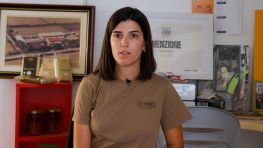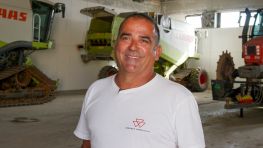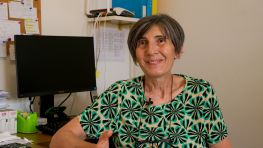 Rosalia Vacca and the Dream of…
Rosalia Vacca and the Dream of… Giuseppe Goio
Growing organic rice: the pleasure of going back to being a farmer.
Giuseppe Goio inherits from his father the farm that had already belonged to his grandfather. In the seventies his father, wanting to extend the arable area, bought some land in Masserano, virgin land of Baraggia, freeing them from the vegetation and leveling them to obtain the paddy rooms. Giuseppe remembers himself as a five-year-old already driving a tractor.
The passion for agriculture begins to find an exceptional place in Giuseppe's heart and to support his work even in times of difficulty. In fact, over the years his small farm becomes less and less competitive compared to the large farms of the plain and to imported paddy rice which increasingly thins company margins. Just the urgency to make ends meet pushes Giuseppe to look for alternatives to the "conventional" agriculture that he had always practiced.
Luck turns, and just when it seems that there is no solution to the red accounts, Giuseppe begins to experiment with the green mulching method to grow organic rice. The reduction of costs obtained through the elimination of costs for fertilizers and chemical products combined with the reduction of the cost of fuels and agricultural vehicles finally guarantees the much desired economic sustainability. Giuseppe also finds something that he had lost for years now: the pleasure of being a farmer, the pleasure of being in contact with the earth, listening to it with all his senses, a relationship that enriches him day after day.
Video table of contents
- The origins of the farm in the wild Baraggia di Masserano.
- From an early age I have been passionate about agriculture.
- Nineties and the use of chemistry: the illness and death of his father in 2000.
- The first doubts about my work: the dependence on technicians and synthetic products, the drop in production, the first attempts to rotate with soy.
- The bad vintage of 2014 and the need to change the system, the Stocchi method.
- Rotation and use of weeds as organic matter and nourishment.
- Rice on green mulch, the absence of chemicals and the planting of the banks to reconstitute an ecosystem.
- Unconsciousness and desperation have governed the transition to organic farming.
- The conventional does not favor collaboration, but in the organic sector it is fundamental: the concept of collectivity.
- 600 hectares planted with organic rice, all small farms. Organic and economic sustainability.
- The business network to collaborate in the sale of the finished product and the Biodistretto.
- The landscape, as it has changed with the planting, the weeds, the wild animals instead of the barren stubble.
- The soil structure that improves year by year offering more productive and easier to work soils.
- The importance of the sensitivity and the ability to observe of the organic farmer.
- Rosa Marchetti, a seed that germinates quickly and protects itself well from weeds.
- I have had the same seed for 6 years: I keep my weeds and I have no germination problems. Dealing with native weeds.
- I was a farmer who no longer touched the earth. After converting to organic, I also built a vegetable garden.
- Mechanized monoculture does not offer opportunities for young people.
- The Panissa Vercelli.
- The flowering of rice, a delicate moment.
Interview information
Country: IT
Region: Piemonte
City: Rovasenda
Giuseppe Goio
Date of birth: 11-20-1968
City: Gattinara
School: High school or Secondary
Profession: Farmer
Languages: Italiano
Document by: Luca Ghiardo
Video by: Luca Ghiardo
Created: 01-06-2020
Questo video fa parte del seguente archivio
Rice stories
Rice stories
Food is a fundamental resource for man and his health, both through the supply of nutrients and the ability to embody traits of human culture that play a leading role in our well-being.
Over time, each territory has built original ways in which to relate to the fruits of its land, enriching them with rituals, symbolic meanings and culinary customs. Much of these relationships have been lost following the years of the economic boom, with the exodus from the countryside to urban centers, with the advent of agriculture for mass production and ultimately with the globalization of markets and the consequent impoverishment of the heritage of biodiversity and ethnodiversity.
The purpose of this archive is to collect evidence relating to the main rice production area in Europe, that is the Po Valley, and to investigate, through the analysis of textual sources and testimonies collected in the field, both what survives of this heritage, and the ways in which which has evolved and reached us, paying particular attention to the explicit and implicit links that bind food and health.






